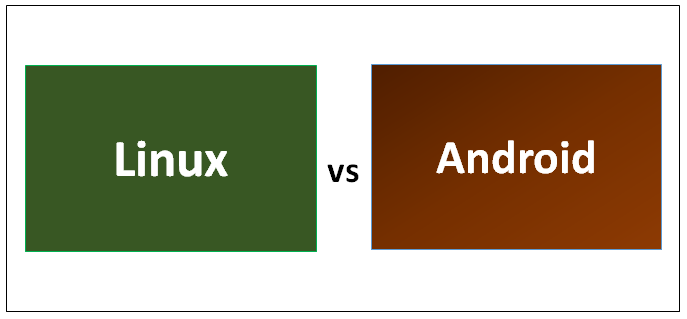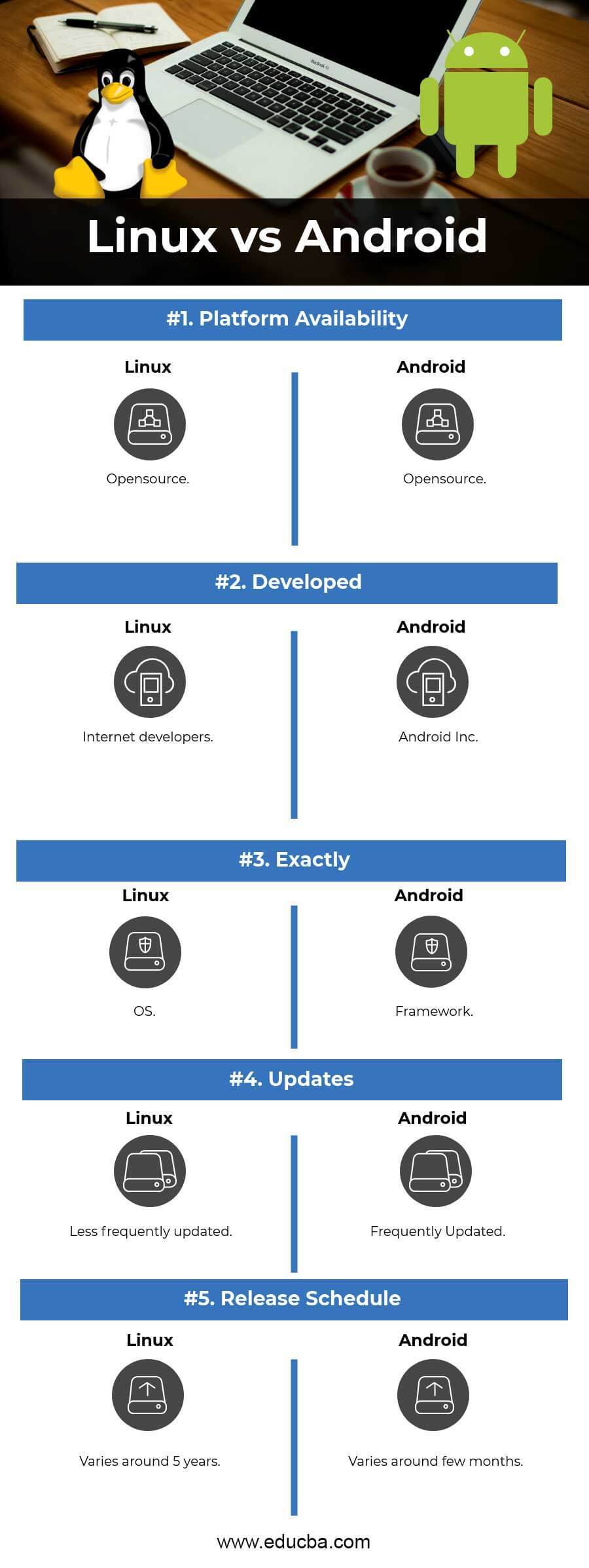Updated May 11, 2023
Difference Between Linux vs Android
Linux runs across numerous systems in the market, and it is the majority of a community-based setup. It is a monolithic OS where the operating system executes completely from the kernel. Android is an open-source operating system primarily built for mobiles and tablets. Android plays a vital role on mobile devices, yet it’s a framework that stands on top of this Linux kernel.
Linux
Linux was built by Linus Torvalds, a Finnish student who aims to provide open-source OS in the market. Linux was a derived version of Unix.
Often compared with Commercial UNIX systems but much more reliable than desktop-oriented systems ideally built for power users and programmers.properties of Linux systems,
- Open source and can be easily downloaded.
- Installation can also be performed with ease.
- Quiet, stable OS.
- A group of Internet developers developed it.
Joining the desktop market. Linux developers resolute networking service as the prior stuff, with office applications being the bottom of the priority. Linux also provides trade services and database support for organizations like Amazon, the German army, US Post Office, etc. Especially internet providers and internet service providers have grown fond of Linux as a firewall, proxy- and web server. You will find a Linux box within reach of every UNIX system administrator who appreciates a comfortable management station. As a Linux user today, all means of getting to know your system inside out, but it is no longer essential to hold the knowledge to make the system comply with your requests.
Android
Android primarily satisfies low-powered devices and uses Java, which executes on virtual machines. Android Inc initially created the platform, which Google later acquired.
Android OS systems are frequently updated, and a new name is associated with each release. The frequent release of versions simultaneously makes several pieces of information on the system obsolete.
Standard features of Android OS:
- Mobile development open platform.
- Hardware reference well suitable primarily for mobile devices.
- Linux 2.6 is used for powering the system.
- An application and UI framework are involved.
Here the application layer acts as the top layer holding its libraries in action. All these libraries are built using C/C++ languages.
Dalvik Virtual Machine
Android-based systems utilize the Dalvik VM, which executes a special bytecode instead of directly managing the resident Java bytecode. To enable this, Android-based systems use an inbuilt tool for converting Java classes to DEX.
The DVM functioning is optimized to carry out as efficiently and effectively as possible on mobile devices usually equipped with a slow CPU. The DVMs are implemented to execute multiple VMs in an optimized manner.
Head To Head Comparison Between Linux vs Android (Infographics)
Below are the top 5 comparisons between Linux vs Android:
Key Difference Between Linux vs Android
Let us discuss some of the major differences between Linux and Android:
- Mainly, personal and office users develop Linux and build Android peculiarly for mobile and tablet devices.
- Android holds a more significant footprint compared to LINUX.
- Usually, multiple architecture support is provided by Linux, and Android supports only two major architectures, ARM and x86. The ARM platform is widespread on mobile phones, while the Android-x86 targets mainly Mobile Internet Devices. This functionality acts as the fundamental difference between the two Operating Systems; it acts as a key difference between Linux vs Android.
- APM accomplishes power management. Android relies most on its power management module, which stands very close to Linux power extensions.
- Linux is a popular OS, whereas Android is a framework executing on the Linux kernel.
- Linux system uses magnetic drives, standard Linux systems use the EXT journaling file system to provide a robust file system, and embedded systems use solid-state memory devices such as NOR for code execution and NAND for storage. On the other hand, android systems use flash memory for storage-related needs.
- Linux systems use the GNU C library; Android uses a C library. Booting an Android device, the kernel loads just like it would on a Linux distribution. However, most of the software is different. Standard Linux distributions use Android without an association with a GNU C library.
- Android uses Dalvik virtual machine to run its applications; several top mobile developers use JVM for its execution. Conversely, Linux does not take in any VMs for execution.
Linux vs Android Comparison Table
Below is the topmost comparison between Linux vs Android:
| Basis of Comparison Between Linux vs Android |
Linux |
Android |
| Platform Availability | Opensource | Opensource |
| Developed | Internet developers | Android Inc |
| Exactly | OS | Framework |
| Updates | Less frequently updated | Frequently updated |
| Release schedule | Varies around five years | It goes around a few months |
Conclusion
Mobile and tablet devices use Android, an open-source operating system that runs on top of the Linux Kernel distribution. Android plays a vital role on mobile devices, yet it’s a framework that stands on top of this Linux kernel. On the other hand, Linux is a legacy OS that is highly suitable for desktop and system users.
Recommended Articles
This has been a guide to the top differences between Linux vs Android. Here we discussed Linux vs Android key differences, infographics, and a comparison table. You may also have a look at the following articles to learn more –




